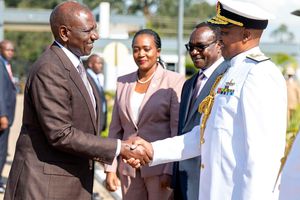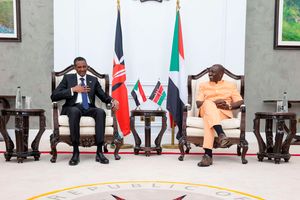
People dump pans of granite at Pissy Granite Mine in the centre of Ouagadougou on January 29, 2022.
In 2021, 2022 and 2023, popular coups in Mali, Burkina Faso and Niger yielded new leaders in these former French colonies. Subsequently, they exited one of Africa’s biggest regional blocs, the Economic Community of West African States (Ecowas), and formed a new confederation, Alliance des États du Sahel (AES) or the Alliance of Sahel States at the end of 2023.
This move signaled their intention for integration and cooperation around economic sovereignty and security. They have since instituted a common passport and flag and expressed intention to exit the Communaute Financiere Africaine (CfA) currency regime. Reportedly, Togo, Senegal and other neighbouring states are showing interest in joining the AES.
The ejection of French troops, ending their military presence in these countries is one of the powerful symbols of the determination of these movements to banish military and economic subservience to colonial powers. Underlying the coups was widespread and deep-rooted public discontent with foreign domination, exploitation and poverty, fueling an irreversible quest for change. The new leaders are seen to represent the aspirations of a mass struggle.
The support to the new leaders is not blind but conditioned on their sustained furtherance of the public common interest.
A misstep by Ecowas in threatening war and imposing sanctions (at the behest of imperialist interests), worsened the economic situation in these countries and only toughened their resolve for integration via the AES.
Although considered poor, these countries are mineral-rich (in gold, lithium, iron ore, uranium and so on). Mali is Africa’s second largest gold producer. The AES nations are taking bold steps to leverage this material wealth to deliver their people from dehumanising poverty.
They are instituting policies and actions that ensure that the wealth derived from mineral exploitation is better distributed for the benefit of citizens. A strategy of nationalising key mineral resources aims to escape the dependence trap, using mineral extraction in a game changing way. They are doing so via stricter regulation of mining operations, asserting greater control over mining royalties and levying higher profit taxes. Mali’s 2023 Mining Code is cited to have catalysed a surge in investment in its mining sector.
This shifts the previous power dynamic where foreign companies that own state-of-the art technology disadvantaged the countries via exploitative mining extractive deals and contracts. As a result, they are securing a more equitable share of wealth emanating from their minerals. The other transformative aspect in the AES is their focus on value chain enhancement (to avoid raw material exports dependence). For example, Mali is boosting its lithium production and processing, positioning it only second to Africa’s largest lithium producer, Zimbabwe.
At the end of 2024, a large Chinese lithium producer completed a huge lithium processing plant in Mali. The ownership model in this project, the Goulamina Lithium Mine, gives the Chinese company a 65 per cent stake, leaving the remaining stake-holding to the government (30 per cent), with local investors retaining five percent ownership. Burkina Faso built its first gold refinery in 2024 after nationalising its gold mines. To cut on basic food imports (of bread etc.), it also inaugurated the processing of wheat (and other grains), as well as processing of tomatoes (which they grow in abundance), to produce ketchup for export.
In terms of exiting the tyranny of the CfA franc, the intent is clear and prospects for it are growing. Given the challenging dynamics of currency reform, this is a longer-term goal, with attention going to laying the groundwork for this transition in a deliberate manner as the AES economies strengthen. And there is evidence that the economies of Niger, Burkina Faso are fast growing and expanding.
Another defining feature of the AES countries is their resolve to turn around their security vulnerability through the pursuit of different security partnerships (chiefly with Russia) and the rest of Africa and Asia. This follows decades of allying with France and the West in unequal, proxy security and economic arrangements that did not curtail terrorism or assure security in the region. In Burkina Faso, a central plank of the strategy for addressing the security challenge is to be people centred. By targeting poverty and underdevelopment, key factors which breed the security challenge, the country is implementing economic livelihood projects to assure basic human development for citizens.
While the AES countries continue to be demonised in western narratives, their unorthodox actions to pursue economic sovereignty and development on their own terms, against many odds is perhaps one of the only bright spots in these gloomy times. What is unfolding in the Sahel is noteworthy and significant. It represents hope.
With leaders that are not obsessed with the mechanics of big democracy, through dispersed mobilisation and actions, they are infusing a popular vibe in the civic space.
Naturally, these efforts to shake off neocolonial and imperialist dominance will be seen as threatening to status quo vested interests. Hopefully, any devious machinations will not have the last laugh.
Atieno Ndomo is a Social Policy Analyst with a keen interest in Political Economy










